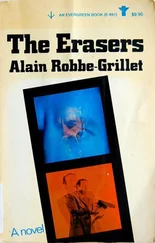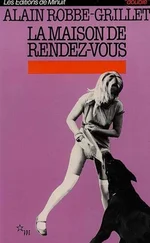Julian’s eyes did not leave the salesman’s face, compelling him to speak, to speak rapidly, as rapidly as possible, in constant fear his mind would be wandering over dangerous ground, or into some place impossible to get out of… he had missed the boat last night; he came back to the farm because he thought he had forgotten something… (no). So he had to wait here until Friday; he would take advantage of his time to get some rest. Nevertheless, he had come back to the farm to sell one or two more watches…(no). He had missed the boat by about three minutes because of the bicycle he had rented, which at the last minute… (no); the chain had been giving him trouble since morning: when Madame Marek had seen him at the crossroads, at the fork, at the turn, he was already trying to get it back into place. Today, with plenty of time to spare, he was making the trip on foot; he was back at the farm to hear about the whole family…
“Did you bring your wrist watches with you?” the old country woman asked. Mathias was about to answer in the affirmative when he remembered he had left his suitcase with his landlady. He thrust his hand into his duffle coat pocket and brought out the only item he had with him: the little gold-plated lady’s model returned this morning by…
“This is the only one I have left,” he said, hoping to get out of the difficulty. Had not Madame Marek expressed the desire to furnish a certain member of her household with a watch—someone who was always late with her work?
The man in the leather jacket was not listening any more. At first, the old woman herself did not seem to understand; then her face brightened: “Ah, you mean Josephine!” she exclaimed, pointing at the girl. “No, she’s not going to get any watch for a present—she’d forget to wind it. And she wouldn’t know where she’d put it. And before three days were up she’d have lost it for good!”
The notion made both of them laugh. Mathias put the article back in his pocket. Deciding the situation was improving a little, he risked a glance in the young man’s direction; but the latter had not moved, nor left off staring at Mathias. The father, who had been silent for several moments, suddenly asked the salesman point-blank: “I was sorry to get home too late yesterday to be able to see you. Do you happen to remember when it was you were here?”
“I’d say around noon,” Mathias answered evasively.
Robert Marek looked at his son. “That’s strange! And where were you at the time?”
A strained silence fell on the room again. Finally the boy decided to open his mouth. “I was in the shed on the other side of the courtyard,” he said, without taking his eyes off the salesman.
“Yes,” Mathias broke in hastily, “that’s quite possible. I didn’t see him because of the haystacks.”
“There! You see!” cried the grandmother. “Just what I said all along!”
“What does that prove?” the man replied. “It’s too easy to say that now!”
But the boy continued: “You got off the bicycle and you knocked at the door. Then you went to look at the gate to the garden. And before leaving you took a key out of a little bag fastened to the seat and used it to tighten something on your gearshift.”
“Yes, that’s right!” Mathias confirmed after each phrase, trying to smile as if these imaginary acts had been as obvious as they were unimportant.
All of which, in fact, merely reinforced his own alibi. Since Julian Marek was bearing witness to the fact that Mathias had been at the farm, had even waited some time for the absent owners, how could he have been on the cliff at the very moment—that is, in the opposite direction where the girl was tending her sheep? The salesman was obviously above suspicion from now on…
At least Mathias wanted to believe he was, with all his might. Yet this unexpected guarantor disturbed rather than reassured him: he invented too glibly. If the boy had really been in the courtyard or the shed at the end of the morning, he knew perfectly well that no salesman had come to the door. On the other hand, if he hadn’t been there and merely wanted to make his father think he had, why would he make up details as precise as the little bag, the key, and the gearshift? The chances he would hit on the exact elements were so slight that their inventor ran the risk of an immediate and categorical denial. The only explanation—madness aside—would be that Julian had known beforehand that Mathias would not contradict him, in any case, because of his own irregular situation—because of his reciprocal fear of a denial.
Now, if Julian knew about the salesman’s questionable status, it was obviously because he had been at the farm at the time of Mathias’ supposed visit; he knew no one had knocked at the door. Which was why he had stared at the stranger so insolently at the very moment he was accumulating his fictitious details…
The question then remained the same as before: what was the boy’s reason for supporting Mathias’ position? Why, having told his father from the start that he had remained in the doorway, could he not defend himself against the declarations made by a passer-by to his grandmother? Was he afraid that the latter had a better chance of being believed than he himself?
No. From the moment Julian began lying—so recklessly—it seemed more likely that things had happened differently: the boy was not at the farm that morning. (On the other hand, he certainly was not in the hollow of the cliff—where he was accused of being; he was somewhere else, that was all. ) And he believed the salesman had visited the farm. But since his father demanded actual proof, he had needed to invent some precise detail—hit upon by chance. In order to ask Mathias’ help—for he would think the whole matter was of no importance to Mathias—Julian had looked him straight in the eyes, hoping to communicate his distress and obtain the salesman’s complicity. What Mathias had attributed to insolence was really supplication. Or else the young man was trying to hypnotize him…
All the way back down the little road, between the gnarled trunks of the pines, the salesman examined the many aspects of the problem over and over again. He reminded himself that his headache might have prevented him from arriving at a solution, for he would certainly have established one indisputably if all his forces had been at his disposal. In his haste to escape that inhospitable kitchen and the young man’s overinsistent stares, he had left without asking for the aspirin tablets he had counted on. Words, efforts of attention, all these calculations had now increased his discomfort to considerable proportions. He would be better off having avoided that damned farm altogether.
On the other hand, wasn’t it worth having provoked such testimony? Julian Marek’s public declaration, no matter how confused his motives, nevertheless was the desired proof that he had been waiting for some time in a place far from the scene of the accident.… A place “far” from the scene? Waiting for “some time”? How much time? As for the distance, the whole island measured only four miles from end to end! With a good bicycle…
After having struggled so hard to establish this alibi—supposing it could free him from all suspicion—Mathias now realized its inadequacy. He had stayed much too long on the cliff to be able to account for his time in this manner. There was still a hole in his schedule.
Mathias again began to recapitulate his movements since leaving the café-tobacco shop-garage. It had been then eleven-ten or eleven-fifteen. The distance to the Leduc house being virtually negligible, his arrival there could be set at eleven-fifteen exactly. This first stop certainly accounted for less than fifteen minutes, although the woman’s chatter had made it seem exasperatingly long. The subsequent stops had been both rare and brief—two or three minutes altogether. The mile or so on the main road, between town and the turn, at full speed and without a single side-trip, had taken scarcely more than five minutes. Five and three, eight; and fifteen, twenty-three…. Less than twenty-five minutes had therefore elapsed between his start at the square and the place where the salesman had encountered Madame Marek. That made it eleven-forty at the most, more likely eleven-thirty-five. Yet this meeting with the old country woman had actually occurred an hour later.
Читать дальше












